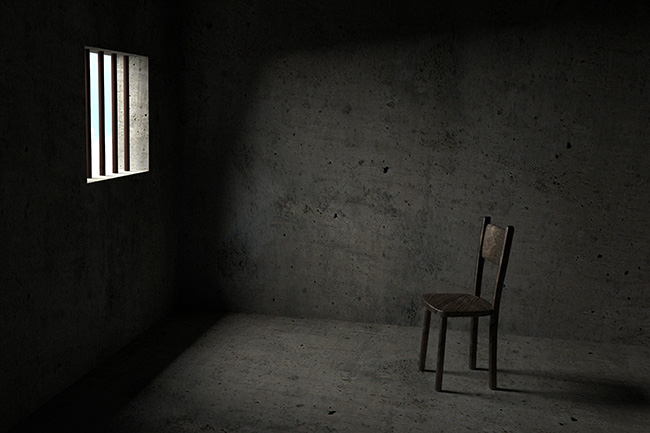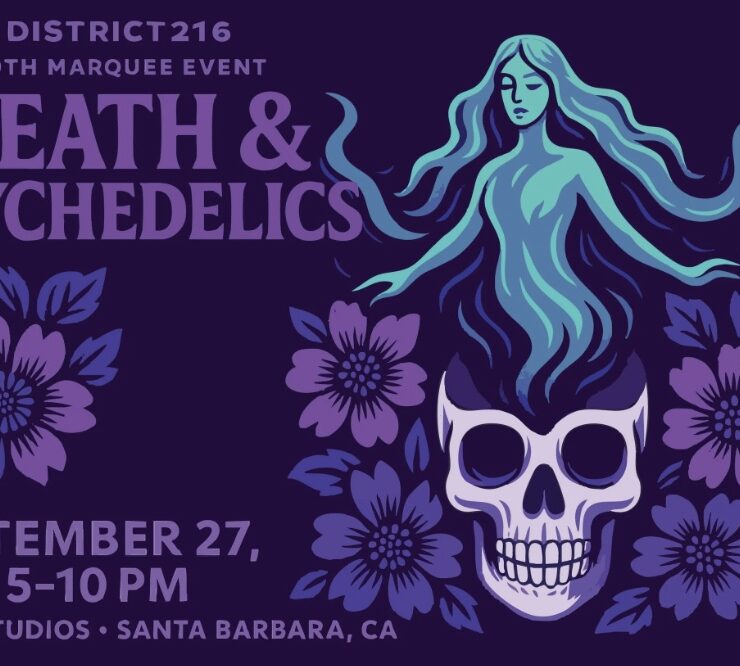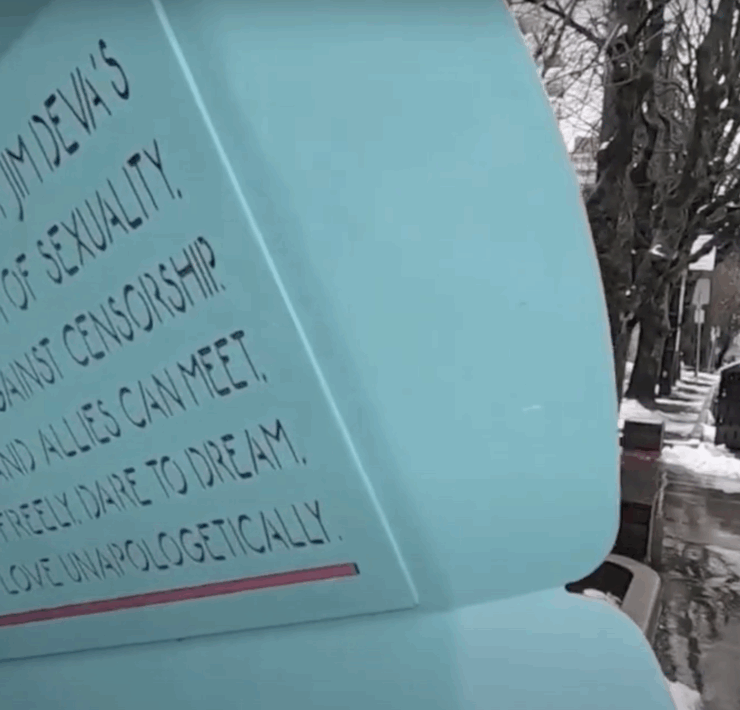Christmas on the Junkyard

After pleading Not Guilty for Reason of Insanity more than 30 years ago, a mental patient seeks the attention of an attorney and a doctor to aid his release
Kyle Harris
Warning: Graphic Language
Charles Parrish faces another Christmas at the Colorado Mental Health Institute at Pueblo (CMHIP). He lives on J2, a floor that patients have dubbed the junkyard ward. “Christmas is usually celebrated big time,” he tells Out Front. “They have a big party, the whole nine yards. This year, they said there is no party [because] there is no money for us.”
He says that in the past, patients wrote a list of three items they wanted, and local churches donated the gifts. This year on J2, only letters are allowed in, Charles says, and for a few weeks, patients can accept sweets. Other presents are banned.
Charles says the hospital will, however, host a cookie party on J2, and patients will compete in an art contest. The winner designs holiday centerpieces for the dining room. Charles, a trained artist, drew a circle and submitted it to protest the holiday cutbacks on J2.
Charles describes himself as “Santa Claus in a wheel chair.” He has long white hair and a bushy beard that he plans to shave when the hospital releases him — if they ever do. Off and on, for more than 30 years, he has been a patient there.
“I’m the only gay person on the unit that I’m on,” he claims. “I get harassed every day because of that, not only by my peers but by the staff. I’m put down because I talk about it. I’m not scared, I’ll admit it 100 percent, but they don’t like for me to talk about it. To me, that’s a hate crime, denying me the right to talk about myself and my emotions.”
He wants a doctor to declare him mentally fit so he can leave. CMHIP doctors call him a danger to himself and society. He also wants a private lawyer, as he can’t reach his public defender on the phone. Charles longs to work a job, to find a partner, and to live on his own, but in the foreseeable future, he’s not going anywhere.
In 1953, Charles was born in Oklahoma to “country bumpkins who had no idea what was going on in the world,” he says. “Growing up from birth to age nine was exciting and wonderful.”
Then, he claims, his uncles molested him again and again, adding that over the years, other family joined in. At 13, “I took a tree branch and began to beat Uncle Buck with it. He knocked me out, and I woke up in the hospital having had a six-inch splinter removed from my rectum.”
“Growing up in that kind of environment, I got to where I could dissociate myself with what was going on. I didn’t know who I was ’cause I didn’t care any more.”
Charles struggled through high school. “People treated me oddly. Everyday there was someone fighting me to prove their manhood. I was a greaser, like in The Outsiders, because I didn’t fit in with the rest of the crowd. I had no close friendships. The only thing we had to do was hunt, fish, and drink. Every now and then, I’d run into one of my kind, usually out in the woods somewhere, and then word got out that I was gay. People started disassociating themselves with me.”
He started hustling on weekends. “My mom and dad were country. They thought I was an important person because a lot of people were coming around. I’d go for a ride, be gone for awhile, and I’d come back and have money in my pocket.”
At 17, he married and had his first of four children. A report written by the Disposition Committee at CMHIP says, “That appears unlikely, given his incarceration.” The report calls him “a notoriously dramatic and inaccurate reporter.”
He graduated high school in 1972 and started hustling daily. He joined the Air Force, but was discharged for “extensive drug use,” states the CMHIP report; he says officers framed him.
“I was molested by three sergeants in basic training. They put a joint of marijuana on me and told me I’d be their bitch and the only way I had out was to get a drug discharge. And that’s the way I did it.
“They had a questionnaire that said, ‘Have you ever used marijuana?’ I said ‘Who’s she?’ They asked, ‘Have you ever done cocaine?’ I said, ‘Is that Coca-Cola?’ They said, ‘Yes.’ I checked that. I had never done drugs in my life. I said yes to everything and got my ass kicked out.“
Back in Oklahoma, he lived in his car until a fellow hustler invited him to move into a squatted basement with 28 others. The homeowners had no idea people lived downstairs. “We were there for nine months. One day, they went down there to check the gas meter.” The squat disbanded.
Charles studied commercial art at Oklahoma State Tech and transferred to Carl Albert Jr. College. The CMHIP record states, “He began community college, but used cocaine.”
“I’ve never done cocaine in my life,” he says.
Charles says he, his wife, and his children moved to Arizona. Though his family quickly returned to Oklahoma, Charles stayed and found a roommate. The police arrested him soon after for stolen property; he claims it belonged to the roommate. He received two years of out-of-state probation and returned to Oklahoma, where he lived in a tree house in a park.
“I was sitting in the park wearing buckskin pants, a buckskin shirt, my hair was past my shoulders, and my beard was like it is now. This guy came up to me to say, ‘Would you like to have a job?’ I had a case of beer and a bag of weed and was like, ‘A job?’ He said, ‘You can have an apartment too.’ I said, ‘Why me?’ He said, ‘You look the part.’ ‘What do I have to do?’ ‘All you have to do is walk on stage.’”
He began acting in “Dust on Her Petticoats,” a play about the Trail of Tears. “I was the first and original Oklahoman to be cast in that outdoor drama musical. That lasted a few months and petered out.”
After a short-lived theater career, he claims to have slept with the financial aid director at Oklahoma State University, who promised to get him into school. “I pretty much got hustled in,” he says. “That’s when my parents found out I was gay. The man in charge of financial aid … he called my parents’ house and told them that he wanted to be with me. My mother and sister were listening on the other end. That’s when they realized, ‘He’s gay.’”
Charles’ parents distanced themselves from him. The financial aid director moved on. Falling behind in his studies, Charles resumed hustling. “I didn’t do much studying as far as reading a book goes. I was studying professors. They were all tea-room totallers. They showed up in the restrooms. You’d follow them wherever they wanted to go, do your thing, and get paid.”
In October 1978, Charles says he met a john. “Are you a cop?” Charles asked. The man said no, so Charles blew him. The man arrested Charles, charging him with sodomy — a crime against nature. “He admitted he didn’t tell me he was a cop,” Charles says. “That’s why that case got thrown out.”
That year, he vacationed to Colorado Springs and claims to have started a relationship with the owner of a prominent Christmas-themed amusement park. Parrish says the businessman and several other “pillars of the community” ran a drug and prostitution ring.
Charles says he continued hustling while working alongside Santa as a clown at the Christmas-themed amusement park. The crime ring bosses allegedly took note of his size and hired him to be a drug runner and collector, and paid him in money, LSD, marijuana, alcohol, a house facing Pikes Peak, antique furniture, two cars, a truck, and a Harley Davidson. “I was 22 years old and had it made in the shade,” he says.
“My main job was collecting the money people owed. I was a delivery boy. I remember looking into a package and thinking, ‘There’s $250,000 in that package.’ He thought about stealing it and hitting the road; he regrets he didn’t.
Charles says the bosses asked him to collect payment from a 79-year-old john, Arthur Sharpe. “He hit me three times and kicked me in the nuts, and I hit him one time and broke his jaw. I figured I’d scare him into making him give me the money. I put him in the closet, lit a trashcan on fire, and blew smoke under the door to make him think the house was on fire.”
“Mr. Parrish exposed his penis and ordered Mr. Sharpe to ‘suck [his] dick,’” reads the CMHIP report. “When Mr. Sharpe resisted, Mr. Parrish urinated on him, beat him, stole his wallet and ring, put him in a closet, pointed a rifle, urinated on him again, stacked furniture against the closet, started a fire in the room, and left. Firemen saved Mr. Sharpe.”
Charles says he called the ambulance and denies urinating on the man. Afterward, he returned to his bosses. “They said, ‘Pack your stuff. You’re leaving. You’re gone. You might’ve hurt this guy.‘ I packed up, left, and went back to Oklahoma. I had no place to go. I had nobody.”
In Oklahoma, Charles walked into a bar, pretended he had a gun, and robbed the joint. “I didn’t get no more than a mile away — all the cops in the county were on my ass. They arrested me on robbery with a dangerous weapon and gave me ten years in prison.”
Colorado extradited him to testify in court. When he got off the plane, the police arrested him for attacking Sharpe.
Charles claims to have recorded the names, addresses, and phone numbers of every john, every drug-buying customer, and his supposed criminal bosses. He threatened them: “If I go down, I’m not going down by myself.” They hired seven lawyers to help Charles plead Not Guilty for Reason of Insanity.
To prove crazy, Charles said, “A demon named Leon made me do it.” Three doctors evaluated Charles and diagnosed him with severe antisocial personality disorder, atypical gender identity disorder, and sexual perversions. Two determined he was sane when he attacked Sharpe, and one argued Charles suffered from a drug-induced psychosis that diminished his responsibility.
Charles laughs at the notion, claiming he had quit drinking and using drugs long before attacking Sharpe. He tricked the system, and the court declared him Not Guilty for Reason of Insanity on August 20, 1981. The day he checked into the Colorado State Hospital (now CMHIP), he learned his term was one day to life.
The trick was on him.
During his first rocky years at CMHIP, staff accused him of fighting and sexual harassment: Charles sexually propositioned doctors, harassed a priest, horseplayed with a nine-year old — the son of the coach of the CMHIP softball league Charles played on — and fought patients. He views most of the accusations as blown out of proportion or untrue; some, he concedes.
In 1992, Charles read the U.S. Supreme Court decision in Foucha v. Louisiana: People declared Not Guilty By Reason of Insanity could no longer be held beyond their prison sentence if they did not have a current mental illness — even if doctors considered them dangerous. Despite an Antisocial Personality Disorder diagnosis, Foucha was released. Charles wanted the same. He took his case to federal court, and lost.
The damning reports continued. CMHIP reports Charles touched a guard. “I don’t remember that,” Charles says, “unless it was one I used to walk up to, rub his shoulders, and say hi to.”
The report states Charles threatened to kill fellow patients. “I never threatened to kill anyone. Except I once said, ‘If I had a gun, I’d blow you away’” to an aggravating peer.
The report states he gambled. “Of course we gambled. We’re only allowed $20 a week. To make ends meet, we’re going to gamble. They don’t let us work. They don’t let us have jobs. There is no other way for us to make money.”
In 1995, Charles escaped the hospital and fled to Oklahoma City for the Prime Timers Worldwide Convention, where he indulged his passion for older men. After, he returned to CMHIP.
In 1999, he says he lived off-site, but was still under the hospital’s care. Staff visited him unannounced, and he participated in AA and sex offender classes. He worked at the Pueblo Chieftain, but quit after a few months. He worked at Souper Salad; he quit that too.
For Christmas, he says he visited his family and then came back to work at Century 400. He was working twelve-hour days until his boss went on vacation and forgot to pay him. Scrambling for rent money, he tried to pull off a robbery and failed.
He was charged with two crimes. “On 5-23-00, the victim, 79-year-old John Stovall, drove on an access road in the Lake Pueblo State Park,” reads the CMHIP report. “At about 11:30 am, Mr. Parrish, driving his van, blocked the park exit, forcing John Stovall to stop his car. Mr. Parrish, while placing a knife at Mr. Stovall’s throat, ordered him to hand over his wallet and keys. Mr. Stovall fought Mr. Parrish and escaped.”
Dr. Matthew Goodwin reviewed Charles’ files and interviewed him to decide if he was mentally fit to stand trial. He was. The court sentenced him to 20 years. Upon release, he would return to CMHIP. (He denies that he committed that crime. In 2003, he appealed his sentence “citing the Court’s denial in regard to suppressing the photographic lineup shown to Mr. Stovall,” and says he won his case.)
Regarding his other alleged crime, “The victims Fidel Pacheco and Kathleen Archuleta reported the following. On 5-23-00, while walking along the Arkansas River trail, the couple espied [sic] Mr. Parrish standing beside several trees fondling his penis,” states the CMHIP report. “When they arrived at their vehicle they saw Mr. Parrish leaning into their vehicle (which had been previously locked). To their surprise, the vehicle’s side rear window was broken. Mr. Pacheco ran towards Mr. Parrish who threatened Mr. Pacheco with a crowbar. Mr. Parrish fled carrying Ms. Archuleta’s purse, Mr. Pacheco’s wallet, and a pair of binoculars. Mr. Pacheco chased Mr. Parrish who fell down an embankment dropping the stolen items.”
Charles pled guilty to First Degree Criminal Trespass on October 29, 2001 and was sentenced to six years in prison. He admits to looking into the car, but only because he wanted to buy it. He denies he broke the window or had a crowbar and says Pacheco never chased him down.
In prison, Charles says he ratted out members of the white supremacist gang, the 211s, with The Aryan Brotherhood’s protection. “It was a bad deal to start with. I owed them either blood on the knife or shit on the shank.” Charles cut himself from his wrist to elbow hoping a suicide attempt would get him back to CMHIP and away from his former protectors. He transferred to the hospital briefly and was returned to the Department
of Corrections.
Prison life wore Charles down; he soothed himself by overeating. Weighing in at 484 pounds, he needed a wheelchair to get around.
In 2013, the DOC released him on parole sending him back into CMHIP’s care. Charles believes he was readmitted illegally and that the “so-called care” is harmful. He claims to battle staff to get out of his wheelchair. “They refuse to let me walk on my own.”
“Staff report that Mr. Parrish has refused to comply with the P.T. [Physical Therapy] which would enable him to leave his wheelchair without falling,” states a CMHIP report.
Since September 2013, Charles has tried to file for release from CMHIP. At first, the courts claimed they never received the papers. When they finally did, Charles claims his public defender told the courts her client was no longer interested in pursuing release. Charles says he’s never met her, and subsequently complained. “The judge appointed another lady to represent me,” he says. “She’s collecting money from the state on behalf of me.”
He claims she also hired a doctor. “[The doctor] said, ‘Because you’re gay, I won’t recommend your release. The only way you’re going to get off of this unit is that the court’s going to release you, or you’re going to get out in a body bag.’ Now I’m stuck trying to find a doctor and a lawyer that will take me pro-bono and get me the hell out of this godforsaken hellhole.”
In September, Charles asked to get out. The CMHIP report summarizes the meeting: “Mr. Parrish is an obese man with a bushy white beard and long grey hair, wearing oxygen, sitting in a wheel chair … his affect is cheerful; he frequently laughs at his jokes even when no one else laughs. Affable, he impulsively makes promises which he is unlikely to keep …
“His speech is facile, goal-directed, loud, dramatic, profuse, notable for references to lawsuits, but not delusional. He does not appear to think prior to speaking …
“His ebullience appears incongruous with the content of his speech. For example, Mr. Parrish gleefully reports that his transfer to J2 was motivated by ‘mind games’ in Geriatrics … he readily and cheerfully acknowledges current problem behaviors such as temper tantrums, getting others in trouble, and racial slurs. He appears neither regretful nor ashamed.
“Interpersonally, Mr. Parrish appears insincere, even oily, acting as if members of this committee are [his] close friends, referencing information that he presumes we already know (but do not).”
The report concludes Charles has “an abnormal mental condition that would be likely to cause him to be dangerous either to himself or others in the community in the reasonable foreseeable future, or is incapable of distinguishing right from wrong, or lacks substantial capacity to conform his conduct to the requirements of the law. He is, therefore, considered to be not eligible for conditional or unconditional release.”
Charles’ despair continues to grow. He says he is fearful of his doctor, Howard Fisher, the subject of a 1993 Westword article. According to the article, the state accused Fisher of lying on his Colorado Board of Medical Examiners exam about the number of patient complaints he had received. The article says Fisher prescribed addictive medications to drug-dependent patients, overused shock therapy (earning him the nicknames Dr. Shock and Reddy Kilowatt), and needlessly recommended a prefrontal lobotomy on a patient.
Recently, Charles’ friend Steve died. “They’re saying he died of natural causes. That same night, I saw the nurse chase him around the yard trying to make him drink this liquid. Five hours later, he’s dead. We believe he was overdosed and given too much medication. They wanted him so drugged up so they could control him more.”
After the loss, Charles says staff organized a pizza party to boost J2 morale. “On October 31, it was Trick Or Treat. They really tricked us. They got us all in the day room. We were all happy and jolly — it was Halloween. Everyone was getting pizza and soda, then the doors were all shut and we had a shakedown. They took everything we’ve got. They took my family photos. They pulled my mother’s picture up and said, ‘Who’s this ugly bitch?’ My mother’s been dead since 2003. I went haywire and said, ‘It’s none of your business. That’s my family. It’s none of your business who these people are.’”
During the shakedown, Charles says staff confiscated his art supplies. He claims to have been painting a card for Steve’s parents when a staff member picked up the card and said, “All you faggots think you’re artists and you know how to draw and paint. Your art sucks.”
“I know my civil rights were violated. They took away all my art supplies. It’s left me with nothing to do but sit around and twiddle my thumbs.”
He has written complaints to DORA, the governor, and hospital staff. “They’ve given me no other option but to write letters. These people were calling me a f*cking faggot and dissing me left and right. They want to say, ‘Oh, it’s no big deal.’ Well, it’s a big deal to me.
“We were sent here for treatment and rehabilitation, and getting neither treatment nor rehabilitation. When you’re in prison, you’re treated a whole lot better. Then you come here where you’re not even supposed to be considered a criminal, and they treat you like crap.
“Dr. Fisher told me, ‘As long as you keep complaining about the way you’re being treated in this institution, you won’t be let off this unit.’ I don’t have a mental illness, but I’m in a
mental institution.
“I’ve got nothing to do here. Nothing. Absolutely zero. Zilch. This institution has screwed us around again. They cancelled Thanksgiving for us, and they cancelled the Christmas stuff for us.”
“We’re told, ‘Christmas is a privilege not a right, therefore, [patients] are not entitled to any form of decorations, presents, party, or any form of religious celebration.’ This alone violates our constitutional rights of freedom of religion and its practices.”
During a recent therapy session, Charles says his group discussed Christmas — depression, homesickness, and fights often accompany the holidays on J2. While other wards have holiday parties, J2 has restrictive security. To make matters worse, his buddy Steve won’t be around.
“We all filed grievances, but grievances only go so far. It’s one of those things they do to punish you, even though we aren’t here to be punished.”
Efforts to communicate with members of the hospital were unsuccessful, and calls to J2 staff went unreturned.
Editor’s note: The staff at Out Front receives calls from members of the community who request that a concerning issue be illuminated in our pages. We decided to give Mr. Parrish, who feels very strongly about his treatment at CMHIP, the proverbial microphone for a piece. Whether or not his claims trigger moral outrage or are simply deemed ludicrous is a matter for the public to decide. We do not purport to substantiate any of his claims, but we do assure that we’ve faithfully relayed the story as it was told to us.
What's Your Reaction?
Founded in 1976, Out Front is the largest LGBTQ news organization in the Rocky Mountains. "Like" Out Front on Facebook: facebook.com/outfrontcolorado, and follow us on Twitter: @outfrontco.










